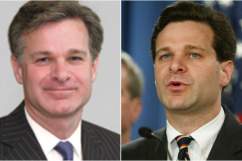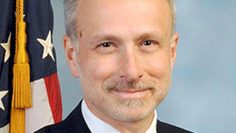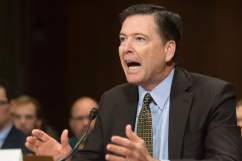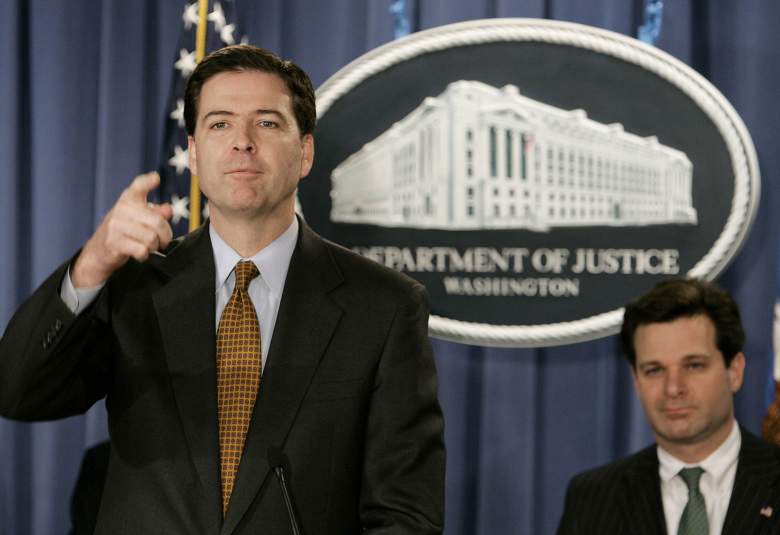
Former FBI Director James Comey with new FBI Director nominee Christopher A. Wray in 2004, when they worked together at the Justice Department. (Getty)
President Donald Trump has chosen former U.S. Assistant Attorney General Christopher A. Wray to be his nominee for FBI Director, replacing James Comey. Wray, who has spent the last 12 years in private practice, worked with Comey for two years at the Justice Department.
Wray was chosen by President George W. Bush to lead the Department of Justice’s Criminal Division and was in office from 2003 to 2005. Since then, he has been a partner at King & Spalding and served as New Jersey Governor Chris Christie’s personal lawyer during the Bridgegate scandal.
Here’s what you need to know about Wray’s work with Comey.
1. Wray Offered to Resign With James Comey During a 2004 Standoff With the White House Over Wiretapping
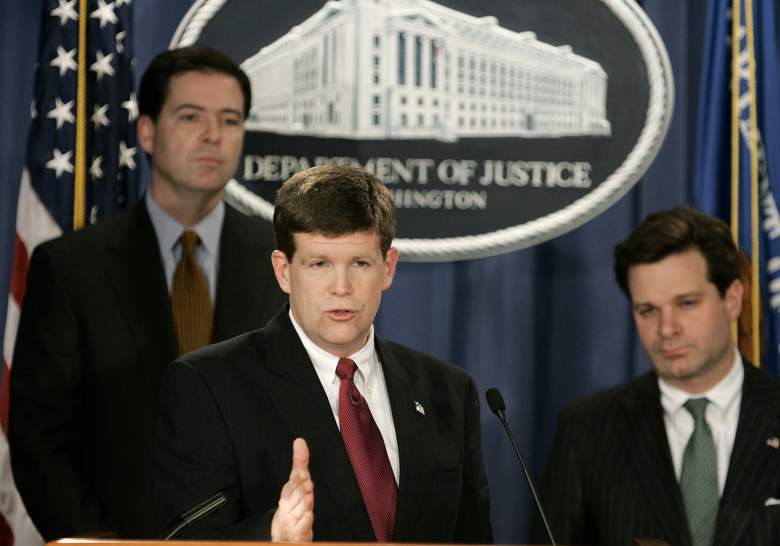
U.S. Attorney Paul Mcnulty of Virginia (center) with Comey (left) and Wray (right) in 2004. (Getty)
Wray was reportedly supportive of Comey when the then-Deputy Attorney General and then-FBI Director Robert Meuller threatened to resign in a March 2004 standoff with the White House. At the time, Comey was acting Attorney General during John Ashcroft’s hospitalization and Comey wouldn’t approve of parts of the National Security Agency’s domestic wiretapping program.
The New York Times reported in 2006 that members of the White House team then went to Ashcroft in the hospital to get the approval. Comey later confirmed that these events happened in 2007 testimony.
Comey eventually withdrew his resignation threat when Bush agreed to make changes to the NSA programs.
According to a 2013 Washingtonian report, Wray showed his support for Comey. He personally stopped Comey in the hallway of the Justice Department building to tell him, “Look, I don’t know what’s going on, but before you guys all pull the rip cords, please give me a heads‑up so I can jump with you.”
Wray resigned from his post in May 2005, notes USA Today, a few months before Comey himself left the DOJ.
2. While Working Under Comey, Wray Focused on Corporate Fraud Scandals, Including an AOL Case
While working under Comedy, Wray handled several important corporate fraud scandals. Comey was president of the Corporate Fraud Task Force, while Wray was a member of that team.
One scandal they worked on together involved AOL and PurchasePro.com in 2004. In December 2004, the Justice Department announced that AOL reached a deal with the government to defer prosecution for two years. The charges focused on aiding and abetting securities fraud in deals between the two sites.
Four PurchasePro.com executives plead guilty to criminal charges. The site no longer exists after its accounting practices made it a target of multiple scandals. In 2008, founder Charles E. Johnson was sentenced to nine years in prison following a seven-year investigation into his company’s practices.
“The Department of Justice will not hesitate to prosecute companies and individuals who use secret side deals to puff up their balance sheets with income that was not earned,” Wray said in 2004. “At the same time, we will take into account steps taken by corporations, particularly if they involve significant remedial actions to ensure that such conduct does not occur in the future.”
3. Wray Also Led the Enron Task Force in 2004 Under Comey
Wray also led the Enron Task Force while working for Comey. Enron was an energy company based in Houston that was formed in 1985. In 2001, it was discovered that its success was only held up by accounting fraud.
In 2004, The Washington Post reported reported that Wray’s task force led to four convictions. One former Enron executive was convicted and four former Merrill Lynch executives who worked to “cook” Enron’s books were convicted. Wray called the trial “a milestone in bringing both an Enron executive and Merrill Lynch executives who aided and abetted the fraud at Enron to justice.”
In addition, 16 people plead guilty to crimes related to the Enron scandal. Auditor Arthur Andersen was also convicted, but The Supreme Court overturned that conviction in Arthur Anderesen LLP v. United States. The court ruled that the jury wasn’t properly explained what the charges were that Andersen faced.
4. Wray Testified That the Patriot Act Was ‘Vital to Our Successes’ in Fighting Terrorism After 9/11
During his tenure under Comey, Wray worked on several terrorism cases. In testimony before the Senate Judiciary Committee in October 2003, Wray said that the Patriot Act played a major role in the government’s success at stopping terrorist attacks after 9/11.
Wray testified:
The Patriot Act has been vital to our success, and this Committee should be proud of its role in passing this critical legislation. Of particular importance, the Act has improved communication and information sharing among the agencies tasked with fighting terrorism, allowed law enforcement to adapt to terrorists’ technologically sophisticated methods, and given investigators and prosecutors stronger tools to identify, pursue, disrupt, prosecute, and punish terrorists. The capabilities afforded to us by the Patriot Act have been and will continue to be critical in bringing terrorists to justice and in ensuring the safety of our country against terrorist attacks.
Parts of the Patriot Act have expired and were removed when Obama renewed it in 2011. The subsequent USA Freedom Act modified the Patriot Act and changed the way U.S. intelligence agencies conducted surveillance after the Edward Snowden leaks.
In his 2003 testimony, Wray noted other moves to stop terrorism:
Through interagency and international cooperation, over half
of Al Qaeda’s leadership worldwide has been captured or killed. We are dismantling the terrorist financial network: $133 million in assets have been frozen in 660 accounts around the world, and investigations of terrorist financing have led to 27 convictions or guilty pleas to date. Our manpower has increased dramatically: Over 1,000 new and redirected FBI agents have been dedicated to counterterrorism and counterintelligence, and positions for 250 new Assistant U.S. Attorneys have been authorized.
Before Wray was nominated to serve as the head of the Criminal Division, he joined the Justice Department in 2001 as an associate deputy attorney general and principal associate deputy attorney general.
The ACLU’s Torture Database includes several messages written by Wray throughout 2004. However, the ones he wrote are redacted.
5. In 2005, Comey & Wray Announced the Indictment of 3 British Nationals Accused of Planning a Terrorist Attack
In 2005, Comey and Wray announced the indictment of three British nationals – Dhiren Barot, Nadeem Tarmohamed; and Qaisar Shaffi – on charges related to planning a terrorist attack. The indictment was announced with U.S. Attorney David N. Kelley of the Southern District of New York and FBI Executive Assistant Director Gary Bald.
The three men were charged with “conspiring to use weapons of mass destruction, providing material support and resources to terrorists, and conspiring to damage and destroy buildings.” The defendants first started surveillance of buildings in New York, New Jersey and Washington D.C. in 2000 and 2001. They were arrested in the U.K., where they also faced criminal charges.
“The conspiracy laid out in the indictment was designed to kill as many Americans as possible, and the alleged surveillance of these buildings makes these allegations all the more serious,” Comey said at the time. “Through the hard work of many of our law enforcement partners both here and overseas, we were able to hold those behind the conspiracy accountable for their actions and ensure that their plans to harm our homeland never materialized.”
Barot was sentenced to life in prison. Tarmohamed and Shaffi were sentenced to 20 years and 15 years in prison, respectively, on the charges they faced in the U.K..
